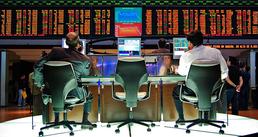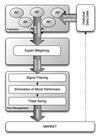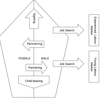Economics

Economics refers to the production, distribution and consumption of goods and services. It investigates how economies work and how economic agents interact. It is most typically associated with the study of finance and business, but covers a wide range of topics including health, politics, crime and education.
For queries about this topic, contact Camillia Zedan.
View the calendar of events relating to this topic.
Projects

An Evolutionary Economic Approach to the Household?
Jason Hilton
The household is a fundamental societal unit. In a huge array of contexts, our understanding of social behaviour relies on an interpretation of how decision are taken at the household level.This work aims to model individual decision-making and interactions between individuals explicitly within the framework of agent-based modelling, following the work of Potts (2000). Potts describes how economic problems can better be dealt with by considering how agents with incomplete, evolving preferences in the form of decision rules interact on a network, and how they cooperate and form ties to produce combinatorial technologies. Following the work of Gary Becker, he then considers how this ostensibly economic framework might hypothetically describe partnership search and household formation and dissolution.

An Investigation into the Cascade Effect of Mergers on the Global Financial Markets
Seth Bullock, Antonella Ianni (Investigators), Camillia Zedan
An investigation into the external effects that horizontal mergers have on the interconnected global markets.

Automated Algorithmic Trading with Intelligent Execution
Frank McGroarty, Enrico Gerding (Investigators), Ash Booth
In this project, we introduce the first fully automated trading system for real-world stock trading that uses time-adaptive execution algorithm to minimise market impact while increasing profitability com- pared to benchmark strategies.

Automated Trading with Performance Weighted Random Forests and Seasonality
Frank McGroarty, Enrico Gerding (Investigators), Ash Booth
This project proposes an expert system that uses novel machine learning techniques to predict the price return over these seasonal events, and then uses these predictions to develop a profitable trading strategy.

CRISIS – Complexity Research Initiative for Systemic InstabilitieS
Frank McGroarty (Investigator), Bob De Caux
A new approach to modelling and understanding financial system and macroeconomic risk and instability

It takes all sorts: the mathematics of people’s behaviour in financial markets
Valerio Restocchi (Investigator), Frank McGroarty, Enrico Gerding
Agent-based models provide a deeper understanding of financial markets than classic models. We model people's behaviour and use agent-based simulations to study financial markets. By analysing the emerging complex dynamics, we achieve a deeper understanding of market participants' behaviours, which are necessary for a deeper comprehension of financial markets themselves.

Modelling the Easterlin Effect
Jason Hilton
This project is an attempt to formalise the Easterlin hypothesis in a simulation model and test its plausibility.
The Easterlin Hypothesis, developed by economist Richard Easterlin, purports to describe a mechanism whereby the fertility decisions of a particular cohort of individuals are linked to population level conditions that held sway when they were born The empirical support for the theory is quite strong for the certain periods in the history of the United States, but elsewhere it is circumstantial and patchy. A simulation model may allows us to test under what conditions it may hold and not hold, and also might help inform more general theory building.

Self Interest & the Evolutionary Optimisation of Adaptive Trading Agents for Continuous Double Auctions
Frank McGroarty, Enrico Gerding (Investigators), Ash Booth
One cannot escape the recent crises in economics and the lack of understanding of financial markets that has been highlighted by them. Improvements to current market models are already being made and a realisation of the power of agent based modelling in such models is evident. In this project we seek to explore an existing model by Cliff of trader behaviour in continuous double auctions. We investigate the strategies that arise in such auctions when trader parameters are evolved with intent to maximise personal profit. Results show different trading strategies to those evolved by Cliff and explanations are given with regards to the self-interest.
People
 Seth Bullock
Seth BullockProfessor, Electronics and Computer Science (FPAS)
 Frank McGroarty
Frank McGroartyProfessor, Management (FBL)
 Antonella Ianni
Antonella IanniSenior Lecturer, Social Sciences (FSHS)
 Mohamed Bakoush
Mohamed BakoushLecturer, Management (FBL)
 Ash Booth
Ash BoothPostgraduate Research Student, Electronics and Computer Science (FPAS)
 Bob De Caux
Bob De CauxPostgraduate Research Student, Electronics and Computer Science (FPAS)
 Greg Fisher
Greg FisherPostgraduate Research Student, Electronics and Computer Science (FPAS)
 Jason Hilton
Jason HiltonPostgraduate Research Student, Social Sciences (FSHS)
 Juraj Mihalik
Juraj MihalikPostgraduate Research Student, Engineering Sciences (FEE)
 Timothy Moran
Timothy MoranPostgraduate Research Student, Social Sciences (FSHS)
 Sabin Roman
Sabin RomanPostgraduate Research Student, University of Southampton
 Camillia Zedan
Camillia ZedanPostgraduate Research Student, Electronics and Computer Science (FPAS)
 Petrina Butler
Petrina ButlerAdministrative Staff, Research and Innovation Services
 Ella Marley-Zagar
Ella Marley-ZagarEnterprise staff, Medicine (FM)
 Enrico Gerding
Enrico GerdingNone, None
 Valerio Restocchi
Valerio RestocchiNone, None